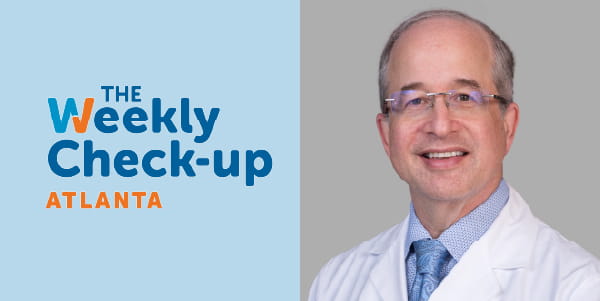 Dr. Scott Miller,
Dr. Scott Miller,
a Wellstar urologist and expert in robotic and laparoscopic surgery, joined
Dr. Bruce Feinberg
on 95.5 WSB’s
The Weekly Checkup.
Together, they tackled common questions about urology, prostate health, incontinence and more.
Does dark urine mean I have a medical problem?
There’s no normal color for urine, Dr. Miller explained. Most of the time, expect urine to be “fairly diluted, almost like water or very pale yellow.”
Urine color may be different in the morning after a night’s sleep without hydration. Some prescription and over-the-counter medicines, like multivitamins, can also affect urine color. Any red in urine could indicate the presence of blood. That’s a sign to call your
primary care provider
or
urologist.
Should I be worried about bubbles in my urine?
That depends, according to Dr. Miller.
“If bubbles form simply because of the way your urine stream hits the water—causing a little turbulence—there’s no need for concern,” he said. “But if you actually feel the bubbles or air passing as you urinate, that’s different. It could indicate a bladder infection or an abnormal connection between the urinary and GI (gastrointestinal) tract.”
In that case, Dr. Miller said a doctor would likely order tests to determine the cause and recommend appropriate treatment.
Do women need urologists?
Yes. Urologists specialize in treating the kidneys and the bladder in both women and men, in addition to addressing prostate health in men.
“Anyone with a urologic issue should see a urologist,” Dr. Miller said. He noted that women are more likely than men to experience conditions like kidney stones and urinary tract infections, making specialized care essential.
Is bladder leakage inevitable with aging?
Dr. Miller noted that bladder control issues are common, but they can be an avoidable part of aging.
“Some females assume bladder control is a natural consequence of childbirth or aging,” he said. “But in reality, these are all treatable issues and sometimes very simple fixes.”
Dr. Miller said that both women and men can benefit from treatments that may include medications, lifestyle changes and minimally invasive procedures. He encourages those experiencing bladder control concerns to talk with their primary care doctor or urologist rather than assume it’s something they must live with.
What about erectile dysfunction? Is it unavoidable with aging?
Erectile dysfunction (ED) can occur at any age, Dr. Miller said. But it is more common as men get older.
“ED isn’t necessarily a direct result of aging. … For instance, testosterone levels naturally decline with age, which can contribute to ED. But that’s not necessarily the cause of the erectile function,” he said.
Underlying health conditions, such as heart disease, are sometimes related to ED and are more common as people age.
People with other diseases, such as diabetes, may also experience erectile dysfunction, he explained.
At any age, patients should see a doctor as soon as they start having erectile dysfunction, Dr. Miller said. Doctors can test and rule out other causes. Early treatment for erectile dysfunction is often more successful than when patients delay seeing a doctor.
Is vasectomy safe? Is it reversible?
Not only is vasectomy safe, but it’s also the “most effective form of permanent birth control,” Dr. Miller assured listeners. The outpatient procedure is performed in a doctor’s office, and recovery is quick.
Some men worry that a vasectomy might affect their sexual function or desire, but that’s not true, Dr. Miller added. Vasectomy doesn’t affect the testicles, where testosterone, the male hormone, is produced or the delivery of the hormone to the bloodstream.
Dr. Miller said that when patients ask if vasectomy is reversible, he cautions that while vasectomy reversal is possible, it is a complex procedure with no guarantees. The patient’s age, how much time has passed since the vasectomy and the partner’s fertility all influence the chances of achieving pregnancy.
“So, never count on it,” he said. “But there are other ways to achieve pregnancy, even in someone who has had a vasectomy, including retrieving sperm directly from the testicle” then attempting in-vitro fertilization.
If I have prostate cancer, does that mean I need surgery?
Advances in prostate cancer detection and treatment have changed considerably in how doctors treat the disease, Dr. Miller said.
“Up to 40% of all prostate cancers we diagnose are at least initially candidates for active surveillance,” he said. Of those, 40 to 50% will, over three to five years, require treatment. Even in those cases, he added doctors “have a lot of ‘runway.’”
“It’s like landing a commuter jet on a 747 runway. We don’t need to start at the very beginning of the runway to safely land before the runway runs out,” he said.
For some patients, that may eventually mean they are candidates for
laparoscopic surgery
to remove the prostate gland or parts of it that are cancerous.
Advances in
diagnostic tools,
such as MRIs,
genetic testing
and genomic testing, have also revolutionized the detection and treatment of prostate cancer, according to Dr. Miller.
Genetic testing can help determine a person’s risk of developing prostate cancer, while genomic testing reveals the molecular makeup of tumors and helps guide treatment decisions between doctors and patients.
Can I change my diet to prevent kidney stones?
Dr. Miller recommends two dietary habits to help prevent kidney stones: drinking plenty of fluids and limiting sodium intake—not only table salt, but also foods high in sodium, including diet and snack foods. He advised that when you have a meal high in sodium, counter its effects by drinking extra water.
In general, “most of the things in your diet will have very little effect on your chance of having kidney stones,” Dr. Miller said.
Because calcium is one of the chemicals that makes up kidney stones, Dr. Miller said many people ask if they should avoid calcium to prevent kidney stones. In most cases, the answer is no. Women especially need adequate calcium in their diets to support bone health and reduce their risk of osteoporosis.
Find a urologist at Wellstar
Do you have questions or concerns about your urinary health? Wellstar’s expert urologists are ready to help. Visit
wellstar.org/urology
to learn more or schedule an appointment.


